翻译家王佐良课堂
- 格式:ppt
- 大小:4.93 MB
- 文档页数:15
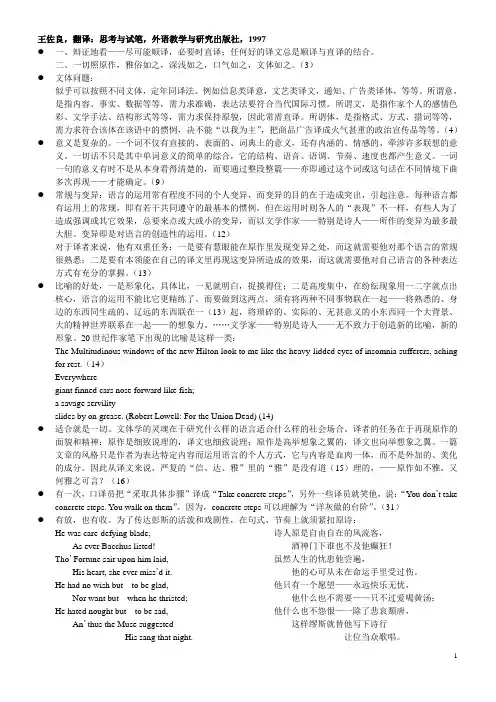
王佐良,翻译:思考与试笔,外语教学与研究出版社,1997●一、辩证地看——尽可能顺译,必要时直译;任何好的译文总是顺译与直译的结合。
二、一切照原作,雅俗如之,深浅如之,口气如之,文体如之。
(3)●文体问题:似乎可以按照不同文体,定年同译法。
例如信息类译意,文艺类译文,通知、广告类译体,等等。
所谓意,是指内容、事实、数据等等,需力求准确,表达法要符合当代国际习惯。
所谓文,是指作家个人的感情色彩、文学手法、结构形式等等,需力求保持原貌,因此常需直译。
所谓体,是指格式、方式、措词等等,需力求符合该体在该语中的惯例,决不能“以我为主”,把商品广告译成火气甚重的政治宣传品等等。
(4)●意义是复杂的。
一个词不仅有直接的、表面的、词典土的意义,还有内涵的、情感的、牵涉许多联想的意义。
一切话不只是其中单词意义的简单的综合,它的结构、语音、语调、节奏、速度也都产生意义。
一词一句的意义有时不是从本身看得清楚的,而要通过整段整篇——亦即通过这个词或这句话在不同情境下曲多次再现——才能确定。
(9)●常规与变异:语言的运用常有程度不同的个人变异,而变异的目的在于造成突出,引起注意。
每种语言都有运用上的常规,即有若干共同遵守的最基本的惯例,但在运用时则各人的“表现”不一样,有些人为了造成强调或其它效果,总要来点或大或小的变异,而以文学作家——特别是诗人——所作的变异为最多最大胆。
变异即是对语言的创造性的运用。
(12)对于译者来说,他有双重任务:一是要有慧眼能在原作里发现变异之处,而这就需要他对那个语言的常规很熟悉;二是要有本领能在自己的译文里再现这变异所造成的效果,而这就需要他对自己语言的各种表达方式有充分的掌握。
(13)●比喻的好处,一是形象化,具体比,一见就明白,捉摸得住;二是高度集中,在纷纭现象用一二字就点出核心,语言的运用不能比它更精练了。
而要做到这两点,须有将两种不同事物联在一起——将熟悉的、身边的东西同生疏的、辽远的东西联在一(13)起,将琐碎的、实际的、无甚意义的小东西同一个大背景、大的精神世界联系在一起——的想象力。
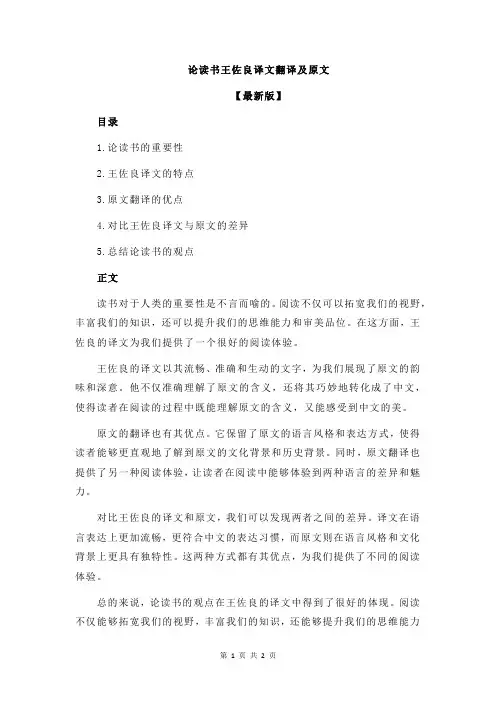
论读书王佐良译文翻译及原文
【最新版】
目录
1.论读书的重要性
2.王佐良译文的特点
3.原文翻译的优点
4.对比王佐良译文与原文的差异
5.总结论读书的观点
正文
读书对于人类的重要性是不言而喻的。
阅读不仅可以拓宽我们的视野,丰富我们的知识,还可以提升我们的思维能力和审美品位。
在这方面,王佐良的译文为我们提供了一个很好的阅读体验。
王佐良的译文以其流畅、准确和生动的文字,为我们展现了原文的韵味和深意。
他不仅准确理解了原文的含义,还将其巧妙地转化成了中文,使得读者在阅读的过程中既能理解原文的含义,又能感受到中文的美。
原文的翻译也有其优点。
它保留了原文的语言风格和表达方式,使得读者能够更直观地了解到原文的文化背景和历史背景。
同时,原文翻译也提供了另一种阅读体验,让读者在阅读中能够体验到两种语言的差异和魅力。
对比王佐良的译文和原文,我们可以发现两者之间的差异。
译文在语言表达上更加流畅,更符合中文的表达习惯,而原文则在语言风格和文化背景上更具有独特性。
这两种方式都有其优点,为我们提供了不同的阅读体验。
总的来说,论读书的观点在王佐良的译文中得到了很好的体现。
阅读不仅能够拓宽我们的视野,丰富我们的知识,还能够提升我们的思维能力
和审美品位。
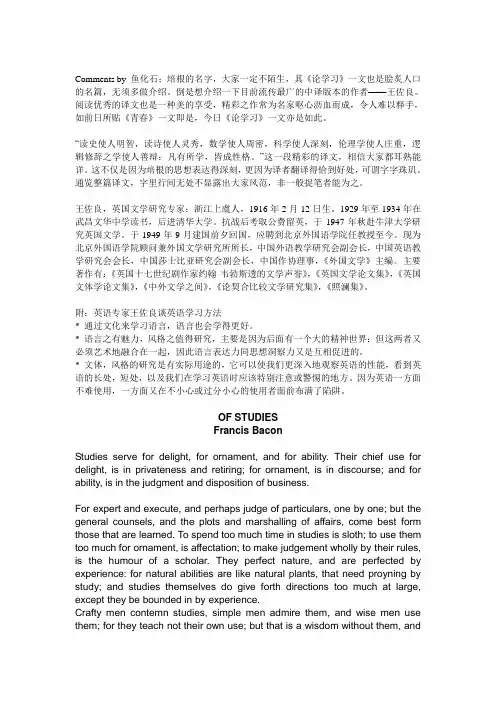
2014年西药药综真题及答案2014年西药综合知识与技能真题一、最佳选择题1. 部分头孢菌素结构中含有甲硫四氮唑侧链,可以竞争性结合γ谷氨酸羟化酶,抑制肠道正常菌群,由此导致的不良反应是A. 凝血功能障碍B. 排异功能障碍C. 造血功能障碍D. 免疫功能障碍E. 勃起功能障碍2. 关于处方的说法,正确的是A. 由医务人员开具,药师审核、调配、核对,作为患者用药凭证的医疗文书B. 由执业药师开具,药师审核、调配、核对,作为患者用药凭证的医疗文书C. 由注册医师开具,药师审核、调配、核对,作为患者用药凭证的医疗文书D. 由实习医师开具,药师审核、调配、核对,作为患者用药凭证的医疗文书E. 由注册医师开具,护士审核、调配、核对,作为患者用药凭证的医疗文书3. 处方正文内容包括A. 患者姓名、性别、年龄、临床诊断、开具日期B. 执业医师签名、执业药师签名、收费人员签名C. 患者的身份证号、代办人员的姓名及身份证号D. 药品名称、剂型、规格、数量、用法用量E. 药品不良反应、药品的禁忌症4. 可与茶叶中的鞣酸结合产生沉淀,饮茶会影响其吸收的药物是A. 硫酸亚铁B. 地西泮C. 对乙酰氨基酚D. 硝苯地平E. 二甲双胍5. 1U维生素A相当于A. 30 μg维生素AB. 3 μg维生素AC. 0.3 μg维生素AD. 0.03 μg维生素AE. 0.003 μg维生素A6. 不会引起嗜酸性粒细胞计数升高的疾病是A. 荨麻疹B. 药物性皮疹C. 支气管哮喘D. 严重烧伤E. 湿疹7. 丙氨酸氨基转移酶(ALT)活力与肝细胞受损程度的关系是A. 呈正相关B. 呈负相关C. 不呈比例D. 关联性不大E. 无关联性8. 成年人空腹血糖的正常值范围是A. 3.9~7.2 mmol/L(70~130 mg/dl)B. 3.9~8.3 mmol/L(70~150 mg/dl)C. 3.9~7.0 mmol/L(70~126 mg/dl)D. 3.5~5.5 mmol/L(60~100 mg/dl)E. 3.9~6.1 mmol/L(70~110 mg/dl)9. 成年人低密度脂蛋白胆固醇的正常值范围是A.0.56~1.70 mmol/LB. 1.2~1.65 mmol/LC. 2.1~3.1 mmol/LD. 3.1~5.7 mmol/LE. 3.3~5.5 mmol/L10. 儿童高热首选的药品是A. 美洛昔康B. 尼美舒利C. 对乙酰氨基酚D. 塞来昔布E. 依托考昔11. 用于缓解鼻塞的α-受体激动剂禁用的人群是A. 糖尿病者B. 血脂异常患者C. 慢性阻塞性肺病患者D. 肾衰竭患者E. 高血压患者12. I度冻疮患者可以选用的非处方药是A. 维A酸乳膏B. 樟脑软膏C. 红霉素软膏D. 杆菌肽软膏E. 洗必泰软膏13. 患者女,22岁,既往有胃溃疡史,因焦虑、手颤就诊。
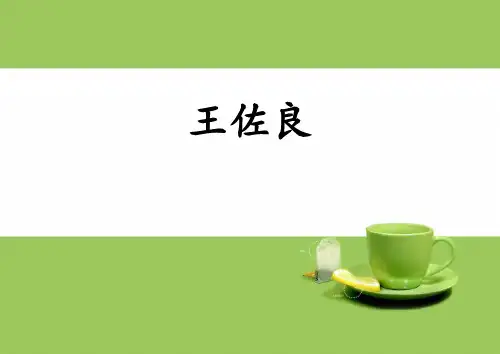
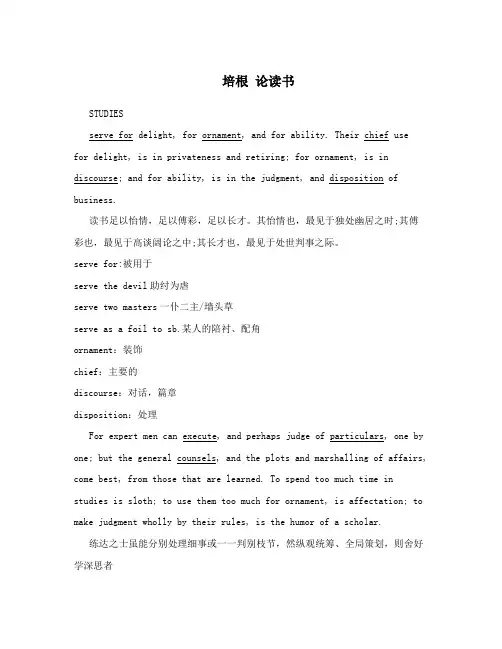
培根论读书STUDIESserve for delight, for ornament, and for ability. Their chief usefor delight, is in privateness and retiring; for ornament, is in discourse; and for ability, is in the judgment, and disposition of business.读书足以怡情,足以傅彩,足以长才。
其怡情也,最见于独处幽居之时;其傅彩也,最见于高谈阔论之中;其长才也,最见于处世判事之际。
serve for:被用于serve the devil助纣为虐serve two masters一仆二主/墙头草serve as a foil to sb.某人的陪衬、配角ornament:装饰chief:主要的discourse:对话,篇章disposition:处理For expert men can execute, and perhaps judge of particulars, one by one; but the general counsels, and the plots and marshalling of affairs, come best, from those that are learned. To spend too much time in studies is sloth; to use them too much for ornament, is affectation; to make judgment wholly by their rules, is the humor of a scholar.练达之士虽能分别处理细事或一一判别枝节,然纵观统筹、全局策划,则舍好学深思者莫属。
读书费时过多易惰,文采藻饰太盛则矫,全凭条文断事乃学究故态。
![[浅析王佐良的翻译观]王佐良翻译观](https://uimg.taocdn.com/b3d83bacb307e87100f696e6.webp)
[浅析王佐良的翻译观]王佐良翻译观2、王佐良的诗歌翻译思想2.1独特的选材观。
王佐良先生一生翻译过的很多著名诗篇都是经过他严格地挑选后才进行翻译的。
在选材上,他曾经说过,译者应该译与自己风格相近的作品,无所不译必然导致劣译。
他说,翻译是一个让译者适应他人风格的过程,也是一个往译作中施加自己个性的过程。
所以,他在翻译彭斯的诗歌时,感悟到了彭斯在诗里体现的情感:“他一生坎坷,但是他活得生龙活虎一般,不向权贵低头,对社会有理想,对爱人和友伴充满着热情,绝大多数的作品所表达的是这样热腾腾的生活感。
”(王佐良1997,80)这样他将这种对原诗作者的感情忠实地抒发在笔端,将一个活灵活现的不向权贵低头,有理想,充满着热情的彭斯就跃然纸上了。
2.2只有诗人才能把诗译好。
也就是说,诗歌翻译需要译者的诗才。
“通常一个译者只适宜于译某一类作品。
我认为他应该只译那一类,而不要什么都译。
翻译家兼诗人查良铮先生译出的《唐璜》非常有名,他也写出了《冬》这样著名的诗。
”因此,王佐良认为,如果一个诗歌译者没有全面地理解这些要素和在诗歌翻译中与其意义相关的其他一些因素,他就不能进行翻译。
2.3诗歌可译。
王佐良从事最多的是诗歌翻译,其翻译思想主要形成于几十年的诗歌翻译生涯。
王佐良认为:诗歌翻译是有所失,也有所得的。
诗的韵、行、词、字数、旬式和速度都有不少困惑,但总的来说是得大于失。
在译诗的方法上,王佐良走了一条最难走的路:以诗译诗。
他不喜复杂的理论,认为应该“尽可能顺译,必要时直译,任何好的译文都是顺译和直译的结合;一切照原作,雅俗如之,深浅如之,口气如之,文体如之。
”(王佐良1989:3)。
诗歌中常用方言,处理方言问题就成了一个难题。
他译彭斯(Robert Burns)诗六十几首。
彭斯的诗多用苏格兰方言写成,套用苏格兰传统的歌谣曲调,如广为吟唱的Auld Lang Syne,(《往昔的好时光》),是地道的苏格兰特色。
王佐良译彭斯诗时,坚持用普通话口语的词汇和句法翻译原诗,十分注意措辞和韵脚排列,如A Red,Red Rose,他将题目译作《一朵红红的玫瑰》。
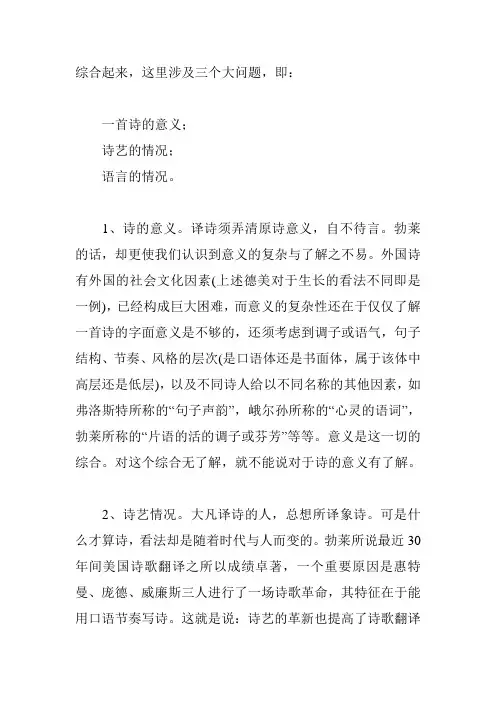
综合起来,这里涉及三个大问题,即:一首诗的意义;诗艺的情况;语言的情况。
1、诗的意义。
译诗须弄清原诗意义,自不待言。
勃莱的话,却更使我们认识到意义的复杂与了解之不易。
外国诗有外国的社会文化因素(上述德美对于生长的看法不同即是一例),已经构成巨大困难,而意义的复杂性还在于仅仅了解一首诗的字面意义是不够的,还须考虑到调子或语气,句子结构、节奏、风格的层次(是口语体还是书面体,属于该体中高层还是低层),以及不同诗人给以不同名称的其他因素,如弗洛斯特所称的“句子声韵”,峨尔孙所称的“心灵的语词”,勃莱所称的“片语的活的调子或芬芳”等等。
意义是这一切的综合。
对这个综合无了解,就不能说对于诗的意义有了解。
2、诗艺情况。
大凡译诗的人,总想所译象诗。
可是什么才算诗,看法却是随着时代与人而变的。
勃莱所说最近30年间美国诗歌翻译之所以成绩卓著,一个重要原因是惠特曼、庞德、威廉斯三人进行了一场诗歌革命,其特征在于能用口语节奏写诗。
这就是说:诗艺的革新也提高了诗歌翻译的质量。
美国诗从惠特曼起走出了一条不同于英国诗的道路是公认的事实,译诗方面成果累累也有目共睹,两者之间显然有关,只是其紧密程度究竟如何需要进一步研究而已。
在我们中国,也有一种类似的发展,即在五四以后白话诗登场,诗艺经过了重大变革之后,外国诗的翻译才繁荣起来。
3、语言情况。
只要动笔,就离不开语言。
但是一种语言有处于比较停滞的时候,也有处于比较活跃的时候。
比较活跃,有利于翻译。
英国翻译的盛日之一是16、17世纪伊丽莎白一世时期,正是英语变动较多、大量吸收外来成分的时期。
中国语言在五四新文化运动期间也处于比较活跃时期,其标志之一是在文学写作中白话代替了文言,这也为翻译带来了一个活动频仍、成果丰硕的繁朵时期。
就译者个人说,他必须对于语言有足够的敏感,必须认识它的特点,层次,精华所在,弱点所在,它的过去与现在,有哪些事是它乐于做也善于做的,又有哪些是它不愿意做也做不好的,特别在它处于比较活跃、变动较多的时候更需有清楚的认识。
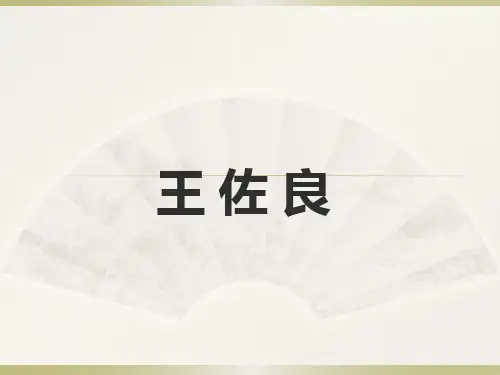


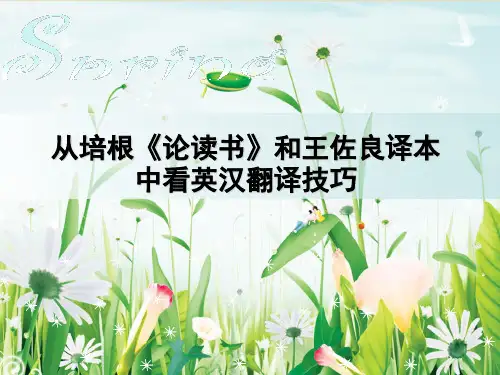
论读书王佐良译文翻译及原文译文:读书能够令人愉悦,让人拥有光彩,增长才干。
它最大的益处是在人们独处幽居的时候。
在人们高谈阔论的时候,它也显示着它的光彩。
而它最能滋长才华的地方则是在人们处理事务和判断事理的时候。
尽管处世经验丰富的人能分别处理繁杂琐碎的事情,也能明察秋毫,但若论统筹兼顾、全盘策划,则非好学深思者莫属。
读书费时过多易惰,文采藻饰太盛则矫,全凭条文断事乃学究故态。
读书虽不能补充人性的不足,但经验又不能补充读书的不足。
天生的才干如同自然的花草一样,需要借助读书来修剪移栽;而书中所学所得则必须经由观察检验才能融会贯通,否则便会大而无当。
拥有某种技能的人往往轻视读书,无知的人羡慕读书,唯有明智之士善于运用读书得来的知识,然而读书并不以用处告人,用书之智不在书中,而在书外,全凭观察得之。
读书时不可存心诘难作者,不可尽信书上所言,亦不可只为寻章摘句,而应推敲细思。
书有可浅尝者,有可吞食者,少数则须咀嚼消化。
换言之,有只须读其部分者,有只须大体涉猎者,少数则须全读,读时须全神贯注,孜孜不倦。
书亦可请人代读,取其所作摘要,但只限题材较次或价值不高者,否则书经提炼犹如水经蒸馏,淡而无味矣。
读书使人充实,讨论使人机智,笔记使人准确。
因此不常做笔记者须记忆特强,不常讨论者须天生聪颖,不常读书者须欺世有术,始能无知而显有知。
读史使人明智,读诗使人灵秀,数学使人周密,科学使人深刻,论理学使人庄重,逻辑修辞之学使人善辩:凡有所学,皆成性格。
人之才智但有滞碍,无不可读适当之书使之顺畅,一如身体百病皆可借相宜之运动除之。
滚球利睾肾,射箭利胸肺,慢步利肠胃,骑术利头脑,诸如此类。
如智力不集中可令读数学盖演算须全神贯注稍有分散即须重演;如不能辨异可令读经院哲学盖是辈皆吹毛求疵之人;如不善求同不善以一物阐证另一物可令读律师之案卷。
如此头脑中凡有缺陷皆有特药可医。
原文:Reading is sufficient to water the mind, to give it color and depth, and to endow it with the power of winging its way through the world. Its value in the retirement and silent hours of thought, and in the need of quick invention, and of being able to meet the crash of the world in a thoroughly off-hand manner, has been already insisted on. A trained person may deal with intricate details or consider various factors with ease; but a general outlook, a connexion, a sort of指挥-in-chief, is the prerogative of those who have had their minds watered by reading.It is a mistake to think that we can get all we want out of books. Evening the score by observation is what is wanted. Books are the best of things provided we use them at the right time and in the right way. It is not books that are to the mind what food is to the body. It is the mind that is to the books what the stomach is to the food. Food is for the body, and books are for the mind. Just as every meal does not fill, so every book is not a banquet.You must choose. You cannot digest every dish that is set before you. A little will serve you; or a great deal, if you can digest it. Some minds are like the seed ground in April showers; they need no deliberate culture, but grow into strong habits of thought in exactly the same way as certain great flowers are trained to fill the Some minds are like the seed ground in April showers; they need no deliberate culture, but grow into strong habits of thought in exactlythe same way as certain great flowers are trained to fill the same space. These natures will go on drawing nourishment from the same kind of food all their lives. They are not the versatile, protean types who, like Proteus, can change their shape every hour. They are not the adventurous spirits who have a passion for new food and strange dishes. They will never feel at home in new surroundings, or be ready at a moment's notice to start on a journey round the world. They are the stay-at-homes, the householders, the men and women of settled and habits of thought. Others, again, are like those acquisitive minds that hanker after everything that is going, thattaste one subject after another, and cannot sit still for a moment. You find them all over the place. They have not settled convictions or principles. They cannot be said to have a character. You may find one who is learned in the literature of all countries, who knows Greek and Latin, and can repeat a passage from Homer or Virgil in one breath, and go on to discuss the last new play or novel of the day in the next. They have read everything, and remember it all; but they are like those who get their living by robbing Peter to pay Paul; they are without a home.It is better to be one of these last than one of the first kind. Theversatile types who read all subjects indifferently may start with a wide range of subjects and an equally wide range of acquirements; but they are likely to peter out in the end into incomplete half-knowledge, which is as useless as if it were ignorance.You must choose. You cannot digest every dish that is set before you. A little will serve you; or a great deal, if you can digest it. The commonest sort of readers are those who read in order to know about things. The second commonest sort read for amusement or for a sort of vicarious life. The third commonest sort read for the sake of the light that reading throws upon life and upon human nature. These last do not find life unworthy of attention: but some among them are disappointed that it cannot be recommended to every one. "Is this all?" they say. "Is this what life is worth? Shall I make no more of it than this?"The answer is that every man should make what he can of life, and that some will make more than others; and that none should be quite sure that he has done so very much, or be too sure that he has done very little. And this also is true: that there is no subject so unpromising that you cannot find something in it worth knowing or doing; and there is no subject so promising that you can ever know or do all that is to be known or done about it. The bookish life, like everything else, has its moments of delusion, when you fancy you have found the philosopher's stone, or something else of equal value; but also it has its moments of sanity, when you are content to know that you have found enough.。
Of Truth谈真理Francis Bacon王佐良译WHAT is truth? said jesting Pilate, and would not stay for an answer. Certainly there be, that delight in giddiness, and count it a bondage to fix a belief; affecting free-will in thinking, as well as in acting. And though the sects of philosophers of that kind be gone, yet there remain certain discoursing wits, which are of the same veins, though there be not so much blood in them, as was in those of the ancients. But it is not only the difficulty and labor, which men take in finding out of truth, nor again, that when it is found, it imposeth upon men's thoughts, that doth bring lies in favor; but a natural, though corrupt love, of the lie itself. One of the later school of the Grecians, examineth the matter, and is at a stand, to think what should be in it, that men should love lies; where neither they make for pleasure, as with poets, nor for advantage, as with the merchant; but for the lie's sake. But I cannot tell; this same truth, is a naked, and open day-light, that doth not show the masks, and mummeries, and triumphs, of the world, half so stately and daintily as candle-lights. Truth may perhaps come to the price of a pearl, that showeth best by day; but it will not rise to the price of a diamond, or carbuncle, that showeth best in varied lights. A mixture of a lie doth ever add pleasure. Doth any man doubt, that if there were taken out of men's minds, vain opinions, flattering hopes, false valuations, imaginations as one would, and the like, but it would leave the minds, of a number of men, poor shrunken things, full of melancholy and indisposition, and unpleasing to themselves? One of the fathers, in great severity, called poesy vinum daemonum, because it fireth the imagination; and yet, it is but with the shadow of a lie. But it is not the lie that passeth through the mind, but the lie that sinketh in, and settleth in it, that doth the hurt; such as we spake of before. But howsoever these things are thus in men's depraved judgments, and affections, yet truth, which only doth judge itself, teacheth that the inquiry of truth, which is the love-making, or wooing of it, the knowledge of truth, which is the presence of it, and the belief of truth, which is the enjoying of it, is the sovereign good of human nature. The first creature of God, in the works of the days, was the light of the sense; the last, was the light of reason; and his sabbath work ever since, is the illumination of his Spirit. First he breathed light, upon the face of the matter or chaos; then he breathed light, into the face of man; and still he breatheth and inspireth light, into the face of his chosen. The poet, that beautified the sect, that was otherwise inferior to the rest, saith yet excellently well: It is a pleasure, to stand upon the shore, and to see ships tossed upon the sea; a pleasure, to stand in the window of a castle, and to see a battle, and the adventures thereof below: but no pleasure is comparable to the standing upon the vantage ground of truth (a hill not to be commanded, and where the air is always clear and serene), and to see the errors, and wanderings, and mists, and tempests, in the vale below; so always that this prospect be with pity, and not with swelling, or pride. Certainly, it is heaven upon earth, to have a man's mind move in charity, rest in providence, and turn upon the poles of truth.真理何物?⽪拉多笑⽽问⽈,未待⼈答,不顾⽽去。